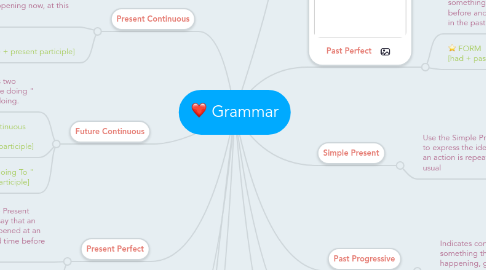Grammar
by Vanessa Camacho


1. Simple Past
1.1. Use SP to express the idea that an action started and finished at a specific time in the past.
1.1.1. Affirmative: subject + verb (in past form) + complement. Negative: subject + auxiliary verb (did) + negacion + verb (infinitive) + complement. Interrogative. auxiliary verb (did) + subject + verb (infinitive) + complement?.
2. Past Continuous
2.1. Use the Past Continuous to indicate that a longer action in the past was interrupted.
2.2. FORM [was/were + present participle]
3. Present Perfect
3.1. We use the Present Perfect to say that an action happened at an unspecified time before now.
3.2. FORM [has/have + past participle]
4. Present Continuous
4.1. Use the Present Continuous with Normal Verbs to express the idea that something is happening now, at this very moment.
4.2. FORM [am/is/are + present participle]
5. Future Continuous
5.1. Future Continuous has two different forms: "will be doing " and "be going to be doing.
5.2. FORM Future Continuous with "Will" [will be + present participle]
5.3. FORM Future Continuous with "Be Going To " [am/is/are + going to be + present participle]
6. Present Progressive
6.1. Indicates continuing action, something going on now.
7. Future Progressive
7.1. Indicates continuing action, something that will be happening, going on, at some point in the future. This tense is formed with the modal "will" plus "be," plus the present participle of the verb (with an -ing ending)
8. Simple Present
8.1. Use the Simple Present to express the idea that an action is repeated or usual
8.1.1. FORM [VERB] + s/es in third person
9. Future
9.1. Simple Future has two different forms in English: "will" and "be going to."
9.1.1. FORM Will [will + verb]
9.1.2. FORM Be Going To [am/is/are + going to + verb]

